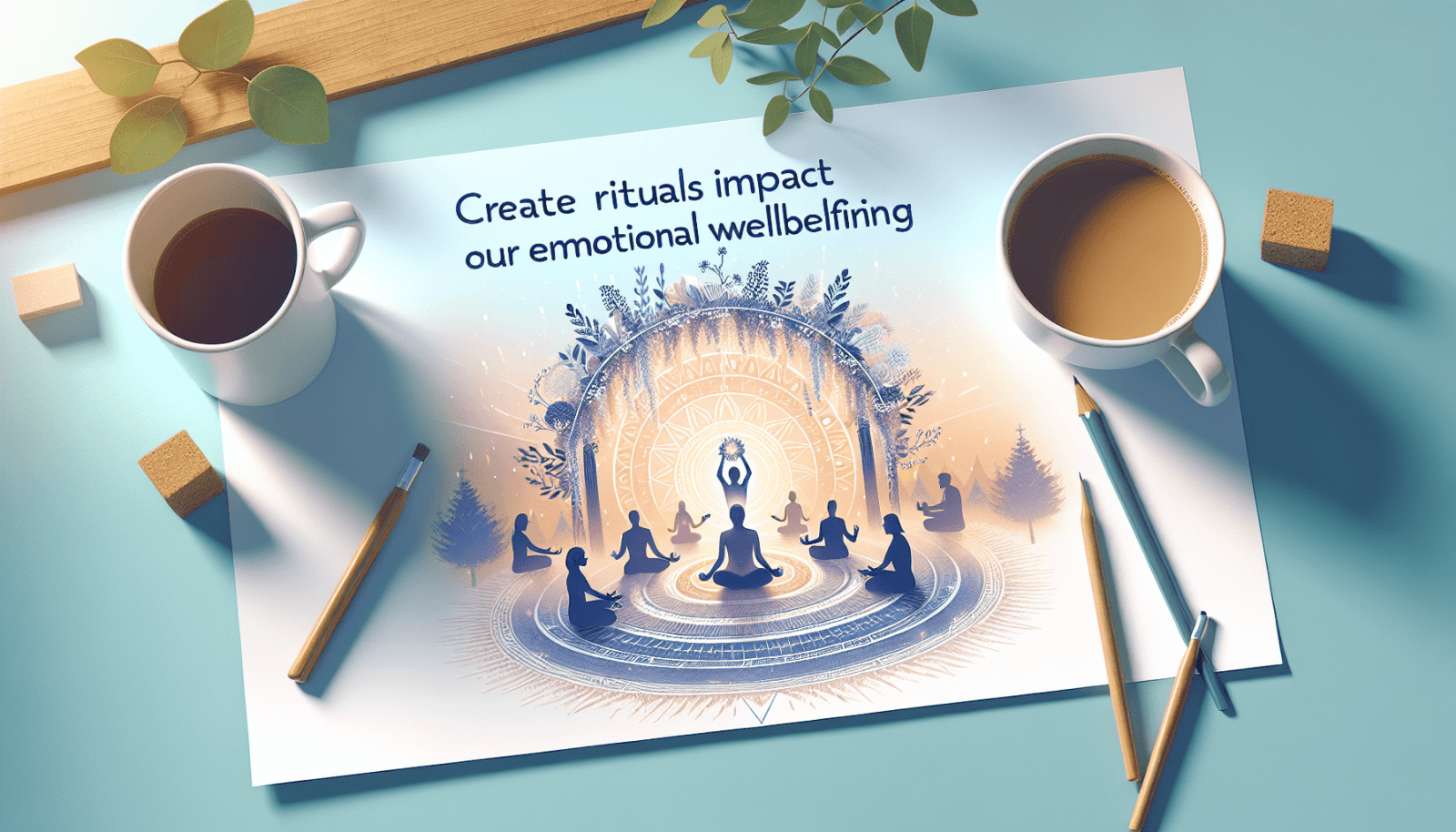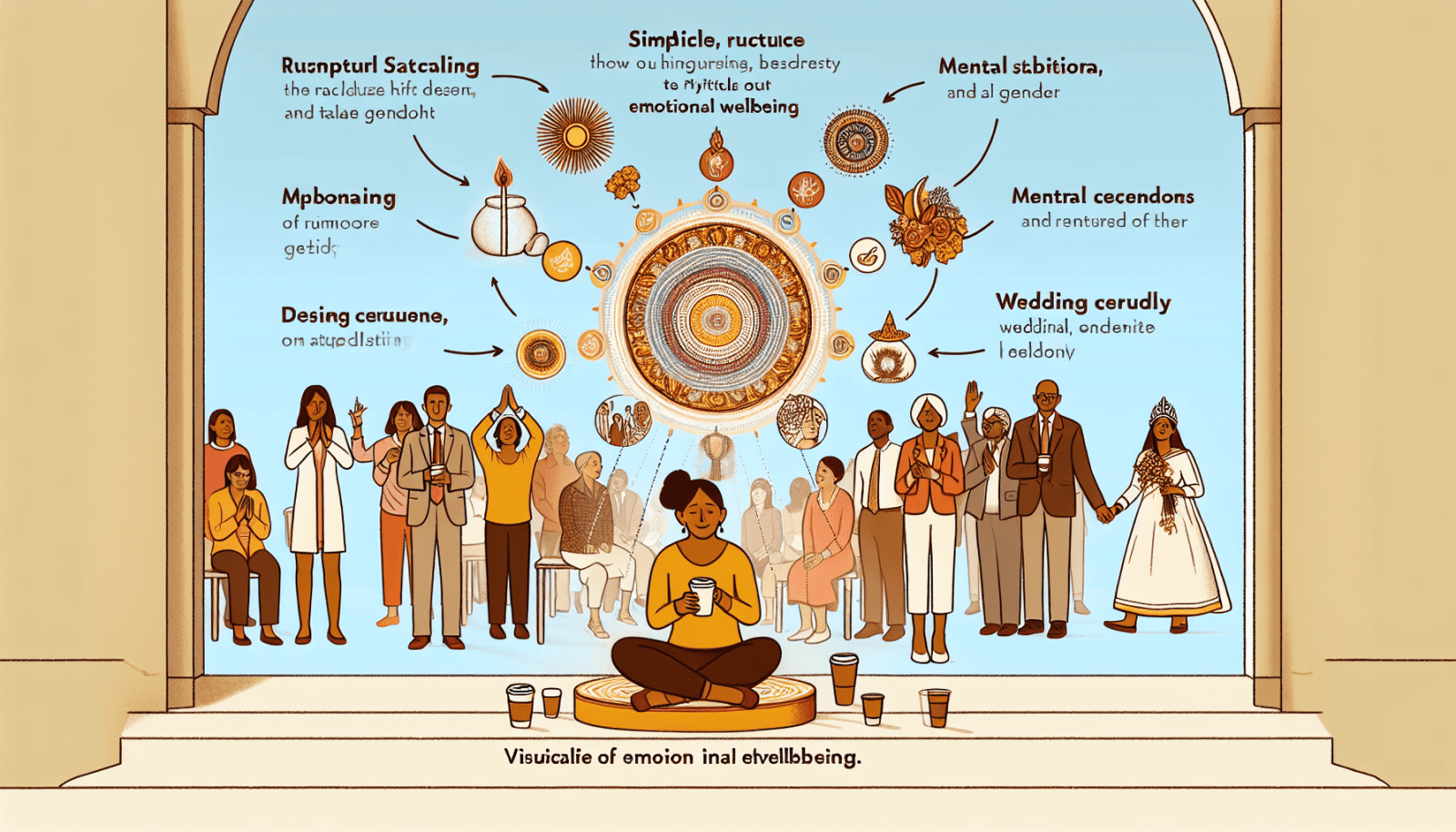In today’s fast-paced and hectic world, finding stability and balance in our emotional wellbeing can be a constant challenge. However, there is a simple yet powerful tool that can contribute to our overall mental health: rituals. Whether it’s lighting a candle, practicing meditation, or engaging in a daily gratitude journal, rituals have been found to cultivate a sense of calm, provide structure, and enhance emotional resilience. In this article, we will explore the numerous ways in which rituals can play a vital role in promoting emotional wellbeing and creating a sense of meaningful connection in our lives.
Introduction
Definition of rituals
Rituals are a set of actions, behaviors, or ceremonies that are performed or repeated regularly, often with symbolic significance. They hold a special place in human culture and have been practiced for centuries in various forms. From religious ceremonies to personal practices, rituals create a structure and purpose in our lives.
Importance of emotional wellbeing
Emotional wellbeing is crucial for maintaining a healthy and fulfilling life. It encompasses our ability to handle stress, build positive relationships, and navigate the ups and downs of life with resilience. When our emotional wellbeing is nurtured and supported, we experience a greater sense of overall happiness and satisfaction.
Understanding Rituals
Meaning and purpose of rituals
Rituals provide a sense of meaning and purpose in our lives. They allow us to connect with something greater than ourselves and provide a framework for understanding and navigating our emotions. Whether it’s a cultural tradition, a personal daily practice, or a therapeutic ritual, they offer a sense of stability and order in an often chaotic and unpredictable world.
Types of rituals
Rituals come in various forms and serve different purposes. Some rituals are performed individually, while others are communal. They may be religious, cultural, or personal in nature. Examples of rituals include daily prayer, meditation, gratitude journaling, family dinners, and celebrations. The type of ritual that resonates with an individual can vary based on personal preferences, beliefs, and values.

Emotional Wellbeing
Definition of emotional wellbeing
Emotional wellbeing refers to the ability to effectively manage and express emotions, maintain healthy relationships, and adapt to life’s challenges. It involves being in tune with one’s own emotional state and having the tools and resilience to navigate difficult emotions. Emotional wellbeing is not the absence of negative emotions but rather the ability to cope with them in a healthy way.
Factors influencing emotional wellbeing
Several factors can influence emotional wellbeing. These include genetics, upbringing, life experiences, social support, and coping mechanisms. Developing emotional intelligence and self-awareness, cultivating positive relationships, engaging in self-care practices, and seeking professional help when needed are all important aspects of nurturing emotional wellbeing.
Benefits of Rituals
Promotes emotional regulation
Rituals play a significant role in promoting emotional regulation. By engaging in consistent and meaningful practices, we create a safe space for exploring and processing our emotions. Rituals such as meditation, deep breathing exercises, or engaging in creative outlets can help regulate our emotions, reducing feelings of stress and anxiety.
Provides a sense of identity and belonging
Rituals also provide a sense of identity and belonging. Whether it’s participating in cultural or religious rituals or engaging in personal daily practices, they help us connect to our roots, values, and beliefs. They remind us of our place in the world and create a sense of belonging to a larger community.
Enhances mindfulness and self-awareness
Engaging in rituals encourages mindfulness and self-awareness. When we engage in a ritual, we are encouraged to be present in the moment and fully experience our emotions. This self-reflection allows us to gain a deeper understanding of ourselves, our values, and our needs. Through rituals, we develop a greater sense of self and increase our ability to make choices aligned with our emotional wellbeing.
Reduces stress and anxiety
Rituals have a calming effect on the mind and body, reducing stress and anxiety. When we engage in rituals, our bodies release hormones that promote relaxation and reduce the stress response. By incorporating rituals into our daily lives, we create a consistent source of comfort and stability, helping to alleviate stress and anxiety.
Fosters emotional connections and relationships
Rituals also foster emotional connections and relationships. Shared rituals, such as family meals or holiday celebrations, create opportunities for bonding and deepening relationships. These shared experiences strengthen our sense of connection and support, contributing to our overall emotional wellbeing.

Rituals for Emotional Wellbeing
Morning rituals
Morning rituals set the tone for the rest of the day. They can include practices such as meditation, journaling, affirmations, or exercise. These rituals help to ground us, cultivate a positive mindset, and create a sense of intention and purpose for the day ahead.
Evening rituals
Evening rituals help us wind down and prepare for restful sleep. Incorporating practices such as reading, taking a bath, practicing relaxation techniques, or expressing gratitude can promote relaxation and release any tensions or worries from the day. Evening rituals encourage a sense of closure and allow us to reflect on the events of the day.
Self-care rituals
Self-care rituals are essential for nurturing emotional wellbeing. They involve activities that bring joy, relaxation, and rejuvenation. Examples of self-care rituals include taking walks in nature, practicing hobbies, indulging in a spa day, or engaging in creative outlets. Regular self-care rituals promote self-love and compassion, providing the emotional nourishment necessary for overall wellbeing.
Coping rituals
Coping rituals are practices that help us navigate challenging emotions and situations. These rituals can include deep breathing exercises, visualization techniques, engaging in soothing activities, or seeking support from loved ones. Coping rituals serve as tools for managing stress, anxiety, and other difficult emotions, providing a sense of comfort and stability in tough times.
Celebratory rituals
Celebratory rituals allow us to mark milestones, achievements, or special occasions. These rituals can include gathering with loved ones, creating rituals around specific holidays, or engaging in personal rituals to celebrate personal accomplishments. Celebratory rituals help us foster a sense of joy, connection, and appreciation for life’s meaningful moments.
Grief rituals
Grief rituals provide a framework for honoring and processing the loss of a loved one or a significant life change. These rituals can include ceremonies, memorial services, or personal practices like prayer or reflection. Grief rituals offer a space for expressing and navigating complex emotions, allowing individuals to find solace, meaning, and healing during times of loss.
Creating Personal Rituals
Identifying personal needs and emotions
Creating personal rituals begins with identifying our personal needs and emotions. Taking the time to reflect on what brings us joy, comfort, and fulfillment can help identify areas where rituals may be beneficial. We must pay attention to our emotions and understand what activities or practices resonate with us on an individual level.
Choosing meaningful rituals
Choosing meaningful rituals involves selecting activities or practices that hold personal significance. It could be something as simple as sipping a cup of tea in the morning or engaging in a daily gratitude practice. The key is to make sure the ritual aligns with our values, brings us joy, and adds meaning to our lives.
Incorporating rituals into daily life
Incorporating rituals into daily life requires commitment and consistency. It may involve setting aside dedicated time each day to engage in the chosen rituals or integrating them into existing routines. By making rituals a priority, we create a sense of structure and intention in our lives, promoting emotional wellbeing.
Cultural and Spiritual Rituals
Cultural rituals and their impact on emotional wellbeing
Cultural rituals have a profound impact on emotional wellbeing. They connect us to our heritage, provide a sense of belonging, and strengthen our cultural identity. Participating in cultural rituals can foster pride and create a sense of community, positively influencing our emotional state and overall wellbeing.
Spiritual rituals and their role in emotional healing
Spiritual rituals have long been used as a means of emotional healing. Whether through prayer, meditation, or other spiritual practices, these rituals allow individuals to connect with their inner selves, seek guidance, and find solace. Spiritual rituals can provide a sense of purpose, hope, and peace during challenging times, contributing to emotional healing and wellbeing.
Rituals in Therapy
Application of rituals in therapy
Rituals are also utilized in therapy to aid emotional processing and healing. Therapists may incorporate rituals such as guided imagery, art therapy, or mindfulness practices to help clients explore and process their emotions. These rituals provide a safe and structured environment for individuals to express themselves, gain insight, and work towards emotional healing.
Rituals for emotional processing and healing
Rituals in therapy can be specifically designed to support emotional processing and healing. They often involve symbolic actions or ceremonies that help individuals externalize their emotions, release pain or trauma, and move towards healing. These rituals can be powerful tools for individuals on their journey to emotional recovery.
Adapting Rituals to Change
Dealing with life transitions and changes
Life transitions and changes can disrupt our established rituals. It is important to adapt and modify rituals during these times to accommodate the new circumstances. Acknowledging the impact of change, seeking support, and creating rituals that address the specific emotions associated with the transition can help navigate these changes more smoothly.
Modifying existing rituals
Modifying existing rituals is necessary when faced with changing circumstances. For example, if a morning ritual involves going to the gym and circumstances no longer allow for it, modifying the ritual to incorporate home workouts or outdoor exercises can help maintain the sense of routine and purpose. Flexibility in adapting rituals ensures their continued relevance and effectiveness.
Creating new rituals
Creating new rituals is essential as we go through different phases of life. New experiences or challenges may call for new rituals to support emotional wellbeing. Whether it’s a new job, a move to a different city, or the birth of a child, incorporating rituals specific to these changes can help navigate the associated emotions and promote overall wellbeing.
Conclusion
Summary of the role of rituals in emotional wellbeing
Rituals play a crucial role in emotional wellbeing. They provide structure, meaning, and purpose in our lives. Engaging in rituals promotes emotional regulation, enhances mindfulness and self-awareness, reduces stress and anxiety, and fosters emotional connections and relationships. Rituals are personal and cultural practices that support and nurture our emotional wellbeing throughout various life transitions and challenges.
Encouragement to incorporate rituals for improved emotional health
Incorporating rituals into our daily lives can greatly improve our emotional health. By identifying our personal needs, choosing meaningful rituals, and adapting them to change, we can foster emotional wellbeing and resilience. Whether it’s a morning ritual to start the day with intention or a coping ritual to navigate challenging emotions, rituals offer a powerful tool for nurturing our emotional lives. Embrace the power of rituals and experience the transformative impact they can have on our emotional wellbeing.
